Producer Ross Hunter’s box-office smash ignited a whole genre of “disaster movies” that followed throughout the 1970s, yet there’s something very “50’s” about the original AIRPORT (137 mins., 1970, G), which makes its 4K UHD debut this month from Kino Lorber along with its three sequels.
 This George Seaton-scripted and directed adaptation of Arthur Hailey’s bestseller is more soap opera than Irwin Allen, at least for its first two-thirds, with “Airport” introducing us to its main leads Burt Lancaster (the workaholic manager of a Chicago airport) and Dean Martin (philandering airplane pilot who just knocked up stewardess Jacqueline Bisset), along with a bevy of supporting players including ace airplane engineer George Kennedy (who appears in all four films) and stowaway Helen Hayes, who only needs a few more one-liners and music by DeVol to turn her scenes into a veritable sitcom.
This George Seaton-scripted and directed adaptation of Arthur Hailey’s bestseller is more soap opera than Irwin Allen, at least for its first two-thirds, with “Airport” introducing us to its main leads Burt Lancaster (the workaholic manager of a Chicago airport) and Dean Martin (philandering airplane pilot who just knocked up stewardess Jacqueline Bisset), along with a bevy of supporting players including ace airplane engineer George Kennedy (who appears in all four films) and stowaway Helen Hayes, who only needs a few more one-liners and music by DeVol to turn her scenes into a veritable sitcom.
“Airport” offers big-screen entertainment of the old-fashioned variety – and I do mean old, as it feels very much anchored to a different time and place, accentuating the personal problems of Lancaster, who’s interested in co-worker Jean Seberg despite being married, and Martin, who’s trying to figure out “what to do” with his unborn. The widescreen Todd-AO trappings of cinematographer Ernest Laszlo provide an elegant visual gloss with Alfred Newman’s classy final score adding to the presentation, yet the movie doesn’t really come alive until the disaster element kicks in nearly 2/3 of the way through.
Perhaps that’s a reason why, when it came time to make the classic 1980 spoof “Airplane!”, there was more grist for the satirical mill in AIRPORT 1975 (107 mins., 1974, PG), the first sequel in the franchise and a movie that provides quite a bit of guilty-pleasure fun. Though initially considered as a TV-movie, Universal wisely opted to ride the crest of the disaster genre’s rise at the box-office, pumping more money into this first “Airport” follow-up and releasing the film just weeks ahead of the studio’s “Sensurround” epic “Earthquake.”
 Like that bigger-budgeted spectacle, Charlton Heston stars here in full-on “hero mode” as a daring pilot who takes command of a 747 damaged by a small plane in a harrowing accident – but not until its voyage is first salvaged by the heroic efforts of stewardess Karen Black (also Heston’s girlfriend), who improbably takes command after pilot Efrem Zimbalist, Jr. is gravely injured (we won’t speak about what happens to his co-pilots, Erik Estrada and especially Roy Thinnes!).
Like that bigger-budgeted spectacle, Charlton Heston stars here in full-on “hero mode” as a daring pilot who takes command of a 747 damaged by a small plane in a harrowing accident – but not until its voyage is first salvaged by the heroic efforts of stewardess Karen Black (also Heston’s girlfriend), who improbably takes command after pilot Efrem Zimbalist, Jr. is gravely injured (we won’t speak about what happens to his co-pilots, Erik Estrada and especially Roy Thinnes!).
There’s more a “Guest Star” component to ‘75, including a singing nun (Helen Reddy), a teenager (Linda Blair, fresh from “The Exorcist”) hoping for a transplant, a group of drunks (Norman Fell, Jerry Stiller, Conrad Janis), a former Tinseltown bit player (Sid Caesar) and even Gloria Swanson herself! George Kennedy reprises “Petroni” also, while the thrills include exciting aerial photography and a suspenseful climax, the footage of which would be recycled in a memorable episode from “The Incredible Hulk” a few years later.
“Airport 75”’s box-office success lead to another follow-up, AIRPORT ‘77 (114 mins., 1977, PG), which battens down the dramatic hatches for a solid enough outing involving a 747 hijacked and left for dead after a botched cargo heist downs the plane inside the waters of the Bermuda Triangle. Pilot Jack Lemmon, thankfully, saves the day after philanthropist Jimmy Stewart’s flight goes down with a bevy of folks on-board, including Christopher Lee’s business tycoon, his unhappy wife (Lee Grant), Lemmon’s own girlfriend (Brenda Vaccaro) and another mix of Golden Age Hollywood talent (Olivia De Havilland, Joseph Cotten) and up-and-comers like Kathleeen Quinlan.
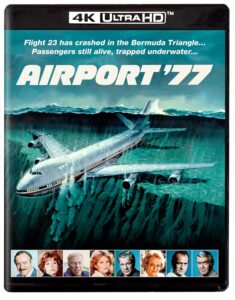 Director Jerry Jameson helms the movie efficiently and the picture is well-made – it just feels a little bit like a low-bar variation on “The Poseidon Adventure” in its mid-section, leading to a competent if overall unremarkable entry on the whole.
Director Jerry Jameson helms the movie efficiently and the picture is well-made – it just feels a little bit like a low-bar variation on “The Poseidon Adventure” in its mid-section, leading to a competent if overall unremarkable entry on the whole.
The genre was drying up by the time we hit the late ‘70s, with Irwin Allen himself having struck out with “The Swarm” and “Beyond the Poseidon Adventure,” while producer Dino DeLaurentiis failed to find many takers for his remake of “The Hurricane.” Universal attempted to exploit the “Airport” franchise one last time with THE CONCORDE…AIRPORT ‘79 (113 mins., 1979, PG), but diminishing returns played out with this decidedly less ambitious affair that nearly resembles a TV movie.
Certainly the cast is more “small screen” with “Guest Stars” like Jimmy Walker, Martha Raye and a brief appearance by Charo making you think Captain Stubing was right around the corner. The movie, scripted by future Oscar winner Eric Roth (“Forrest Gump”!), finds conniving entrepreneur Robert Wagner trying to smuggle weapons and deciding the only way to stop journalist girlfriend Susan Blakely from finding out about his scheme is by taking out the super-sonic Concorde jet she’s a passenger on. That throws her, her fellow passengers and the stalwart crew – including Alain Delon and a returning George Kennedy (Patroni has magically been promoted here to pilot) – into jeopardy as the Concorde has to evade multiple attacks including drone-controlled missiles.
 Complete with a “layover” in Paris so Patroni can bed hooker Sylvia Kristel (then red hot off “Emmanuelle”), director David Lowell Rich’s movie feels notably reduced in scope off the previous “Airport” pictures. That extends to its non-anamorphic lensing, though some decent special effects and Lalo Schifrin’s fine score compensate; overall, I can’t say I didn’t have a good time watching the picture despite its abundant flaws and indifferent execution, with Kennedy’s genial presence carrying the load.
Complete with a “layover” in Paris so Patroni can bed hooker Sylvia Kristel (then red hot off “Emmanuelle”), director David Lowell Rich’s movie feels notably reduced in scope off the previous “Airport” pictures. That extends to its non-anamorphic lensing, though some decent special effects and Lalo Schifrin’s fine score compensate; overall, I can’t say I didn’t have a good time watching the picture despite its abundant flaws and indifferent execution, with Kennedy’s genial presence carrying the load.
All four “Airport” movies have been newly scanned in 4K (all 2.35 except for “Concorde”’s 1.85) by Kino Lorber – the original from a 4K scan “of the 35mm interpositive reduction element,” and the sequels from their respective 35mm OCNs. This makes sense as the first picture looks good if a tad dark at times with its Dolby Vision HDR grading, with good detail but not a whole lot of “pop” in the HDR category. It’s satisfying, but a full-blown restoration of its original negative would have produced greater results (something not cost-prohibitive, however). The sequels all fare better and look superior with nice HDR highlights and pleasing details throughout.
On the audio side, “Airport” offers both 5.1 DTS MA and 2-channel mixes, while the sequels are all offered in both their original mono or quite serviceable 5.1 remixes, which have properly centered dialogue and a nice expansion for their effects and music. Extras include trailers on each disc, a collectible slipcover featuring original theatrical artwork, and new commentaries from (“Airport”) Julie Kirgo and C. Courtney Joyner, (‘75 and ‘79) Steve Mitchell and Nathaniel Thompson, and (‘77) Julie Kirgo and Peter Hankoff.
 Once you’re done making your way through the four “Airport” pictures, you can wash them down with Kino’s appropriately-timed 4K UHD release of AIRPLANE II: THE SEQUEL (84 mins., 1982, PG; Kino Lorber).
Once you’re done making your way through the four “Airport” pictures, you can wash them down with Kino’s appropriately-timed 4K UHD release of AIRPLANE II: THE SEQUEL (84 mins., 1982, PG; Kino Lorber).
Compared to this past summer’s misfired “Naked Gun” revival, “Airplane II” is deserving of a place on the AFI Top 100 comedies list where its predecessor rightly resides. Writer-director Ken Finkleman’s 1982 sequel rehashes many of its predecessor’s jokes, but at least incorporates enough new funny bits to make it worthwhile — including a hysterical William Shatner doing his first genuine bit of self-parody. Naturally, there’s a lack of freshness in the material, but Robert Hays and Julie Haggerty are still appealing as the star-crossed lovers – now on a doomed lunar mission – with Lloyd Bridges and Peter Graves returning along with some new supporting faces (Chuck Connors, Chad Everett, John Vernon, Sonny Bono) and cameos to match (Jack Jones even appears crooning his “Love Boat” theme).
“Airplane II” sports a very satisfying 4K scan of the 35mm OCN (1.85) with Dolby Vision HDR that offers equally nice detail. The original mono is included plus a 5.1 track that mostly just funnels the mono sound into a 5.1 container (it’s nearly all center channel-specific). Commentaries include a pair of options with podcaster Mike White and TV writer Patrick Walsh.
NIGHT OF THE JUGGLER 4K UHD/Blu-Ray (100 mins., 1980, R; Kino Lorber): One of the grimiest, grittiest of all the “Urban Hell”, NYC-set movies of the 1970s, “Night of the Juggler” has also long been one of the most obscure of all major studio releases from its decade.
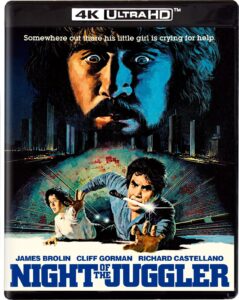 An independent production of the General Cinema movie chain and producer Arnold Kopelson, “Juggler” went out through Columbia Pictures but never got past a VHS release back in the ‘80s — languishing in apparent distribution hell with the occasional New York festival screening over the years providing the film with a “lost classic” designation.
An independent production of the General Cinema movie chain and producer Arnold Kopelson, “Juggler” went out through Columbia Pictures but never got past a VHS release back in the ‘80s — languishing in apparent distribution hell with the occasional New York festival screening over the years providing the film with a “lost classic” designation.
Finally remastered (in 4K, no less), “Juggler” is a dramatically simplistic work, but one that’s so wild and undisciplined – and, yes, packed with authentic location shooting during the infamy of The Big Apple’s urban decay – that it’s impossible not to be captivated by its single-minded plot and realistic depiction of time and place.
James Brolin plays a disgraced ex-cop whose daughter (Abby Bluestone) is wrongly abducted by a psycho (Cliff Gorman) angry by the minorities who have taken over his now-dilapidated neighborhood. Hoping to make a big score by holding for ransom the daughter of a wealthy family, Gorman’s nutcase takes Brolin’s kid instead, leading to a furious Brolin running, kicking, punching, and assaulting his way through what ultimately feels like the entire city of New York: not only Gorman’s unhinged loon, but corrupt cops, thugs, prostitutes, peep show employees, and gangs which look like they just wandered off the set of “The Warriors.”
An adaptation of William McGivern’s novel, “Night of the Juggler” is best described as a “pursuit” picture. The awesome first half-hour – actually the work of its initial director, Sidney J. Furie – plunges the viewer into the action with superb car chase sequences, all cut and edited with tons of extras (and onlookers), making one immediately aware of the venues and era in which the picture was shot. The story offers very little depth or dimension, alas, as Brolin navigates through assorted obstacles single-handedly – not the least of which includes a run-in with dirty cop Dan Hedaya – before finally getting some help in the form of animal shelter worker Julie Carmen (one of the only rays of sunlight this movie has).
“Juggler” was saddled with a bad title and a bizarre poster campaign (involving a bearded Brolin ripping apart the city), one which – in addition to little interest from Columbia – doomed it at the box-office. Seen today – in ironic synchronization with the mass exodus of the city’s populace since COVID – “Juggler” is no classic, with its script failing to deliver much (if any) depth to its characters and the picture fumbling at the finish line due to a lame, sewer-set climax.
Folks expecting another “Taking of Pelham 1-2-3” or “The Warriors” may be disappointed, and it’s unfortunate Sidney J. Furie left the film after shooting its first third – which is, unsurprisingly, far and away its most effective portion. Furie was replaced with Robert Butler, who doesn’t bring nearly the same level of gut-punch the “Juggler” provides in its initial section, while likewise failing to provide a needed respite from the overall nastiness of the film (he does, to his credit, offer a lovely final sequence that plays out over the end credits).
Despite this, “Night of the Juggler” offers a blast of history and location cinematography that’s as good as it gets for transporting the viewer into that infamous moment in time for NYC. The locations are real – the peep shows, the grimy police precincts, the ruined buildings and crime-infested neighborhoods – and the movie gives you a straight-lined story that navigates through all of them, often like a bull in a china shop.
Kino Lorber’s 4K UHD restoration (1.85) hails from a 4K scan of the 35mm OCN. This Dolby Vision presentation is one of the more natural looking, cinematic presentations you will find on UHD, with loads of lovely grain and use of HDR. The movie’s finale is unavoidably dark (a criticism that made its VHS release apparently unwatchable) but the transfer is otherwise fine, even with an erroneous, briefly repeated section of film after Gorman and the girl first get to his “living quarters.” The sound is contained in its original mono mix or a 5.1 track that offers gentle stereo amplification in some sequences; note the movie is very sparsely scored by a credited Artie Kane.
Extras include an informative Steve Mitchell-Nathaniel Thompson commentary; new interviews with Brolin and Carmen; and a visual essay by Daniel Kremer including some of his interviews with Furie (despite this welcome featurette, the issue of why Furie abandoned the movie still remains something of a mystery). Brolin notes the difference in the approach of the two directors and a trailer rounds out the highly recommended package.
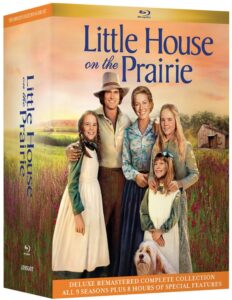
Version 1.0.0
TV on Disc
One of the year’s most expansive Blu-Ray releases is the Complete Series of LITTLE HOUSE ON THE PRAIRIE (170 hours, 1974-83; Lionsgate), Michael Landon’s classic NBC series which adapted Laura Ingalls Wilder’s books for a ratings hit that would keep its initially-struggling network afloat (at times single-handedly) until it passed the torch to “The Cosby Show” (and other “Must See TV” sitcoms) when it completely left the airwaves in the mid ‘80s.
Landon’s heartfelt, if decidedly syrupy, show could be counted on to provide solid family entertainment, which it did for some nine seasons – years of which found the Ingalls family adapting to live in Walnut Grove, Minnesota with its assorted trials and tribulations, be it resistance from the harsh elements to their various relationships with the town’s locals. The Ingalls girls (Melissa Gilbert, Pamela Sue Anderson) would grow up during the course of the series but the show’s values remained steadfast, even when declining viewership resulted in “Little House” being reconfigured during its final season.
Rechristened “Little House: A New Beginning,” the ninth season moved Landon and co-star Karen Grassle out of the picture so Gilbert and co-star Dean Butler (playing Laura Ingalls’ husband) could take over. The changes didn’t help, and Landon would return for a trio of TV movies following its conclusion: Look Back to Yesterday, Bless All the Dear Children, and The Last Farewell, wherein the Ingalls family decides to blow up their small town (literally) to keep it away from grubby bankers.
There are a lot of heavy-handed moments in this series (to say the least) but the show nevertheless enchanted a whole generation (or two) of fans, and Lionsgate’s superlative restorations are now available on Blu-Ray for another crop of viewers to enjoy. The 1080p (1.33) episode transfers are spectacular in terms of clarity and texture – far more detailed than you ever saw them on their original broadcast run. The 45-disc set includes over 200 episodes along with those three close-out TV movies with extras including the original pilot, a six-part documentary, the original screen test between Landon and Gilbert, and more, all in a sprawling package presenting the show in three oversized clamshell cases.

Version 1.0.0
LA FEMME NIKITA: The Complete Series DVD (1997-01; Warner): Luc Besson’s international theatrical hit became a popular U.S. cable series that wrapped up in 2001 after some five seasons on USA. Peta Wilson (who sadly hasn’t been heard of much since, her co-starring turn in “League of Extraordinary Gentlemen” excepted) stars as Nikita, a tough young woman, accused of a crime she didn’t commit, banished to prison before she’s “rescued” by a covert organization and sent to carry out various missions.
Good chemistry between Wilson and co-star Roy Dupuis carried this “Nikita” through 96 episodes, all of which have been assembled here in a Warner DVD box set. The 4:3 (1.33) transfers are all fine for the pre-HD era in which they were shot with stereo soundtracks and extras carried over from their previous season releases. These include a featurette, deleted scenes on three episodes, and an internet teaser with introduction from director Jon Cassar (later a “24” vet) among them.
THE LAST OF US: The Complete Second Season 4K UHD (377 mins., 2025; HBO): Season two of HBO’s highly-rated dramatization of the hugely popular Playstation video game is set within the familiar confines of a zombie-infested, post-apocalyptic wasteland where – 20 years after humanity’s either been wiped out or turned into “infected” mutants – Pedro Pascal’s Joel is tasked with transporting a 14-year-old, Ellie (Bella Ramsey), out of the quarantine zone for unspecified reasons. Their journey across the undead USA is fraught with peril and vividly rendered encounters, but Season 2 of the series basically suffers from the same flaws as its video game sequel source – coming off as heavy-handed at times and relentlessly “down” to the point of beating the viewer into depression.
Viewers didn’t quite warm to Season 2 as much as its predecessor, either, despite the same top-notch cast and technical elements that adorn its production. HBO’s gorgeous 4K UHD transfer with Dolby Atmos sound again provides fans with a superior presentation of “The Last of Us” than its broadcast and streaming versions thanks to its high bit-rate and Dolby Vision HDR implementation. The UHD also comes with over two hours of bonus features and three never-before-seen featurettes along with collectible Steelbook packaging.
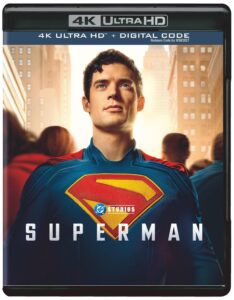 Also New & Noteworthy
Also New & Noteworthy
SUPERMAN (129 mins., PG-13; Warner) has had a rough time of it since Christopher Reeve hung up the cape. First, director Bryan Singer tried and failed with his weird “stalker” Superman (Brandon Routh) in “Superman Returns” (2006), done as a faux sequel to the Alexander Salkind productions, paying a superficial homage to them but without the intrinsic humanity and “verismitilitude” that director Richard Donner instilled in his 1978 classic. Zack Snyder’s 2013 “Man of Steel” offered a more serious approach, rebooting the character with a convincing Henry Cavill, yet in the midst of Snyder’s gritty, dark adaptation of the DC Comics characters — a controversial take which ultimately came apart over creative differences and a “Justice League” project infamously taken away from him (before being handed back as one of the weirdest “moral victories” in cinema history).
Needing a big hit, Warner Bros. has now turned their attention to James Gunn, one of the only directors who took a Marvel property and was able — thanks to its relative obscurity — to make a movie on his own terms seemingly with little studio interference. His “Guardians of the Galaxy” adapted strange, offbeat source material and turned it into one of the comic book movie genre’s shining success stories, working in humor and a grounded, humanistic approach to its characters despite its wild, fanciful settings.
Gunn’s eagerly awaited “Superman” seeks to do the same — and it largely succeeds — despite some pacing issues, easily ranking as of the best films of its kind in many, many years.
Certainly it’s the closest anyone on the big screen has gotten to reprising the sense of goodness, humor and humanity that Christopher Reeve and his Superman pictures did back in the late ’70s and ’80s. Gunn understands what makes the Man of Steel tick, and presents Clark Kent on-screen in the form of David Corenswet, who presents an instantly appealing, likeable Superman at the beginning of his heroic journey. Like Reeve, Corenswet exudes decency without seeming rigid and “alien”, and the picture works best when it depicts Superman’s quest to understand his place in the human world and whether, despite his Kryptonian origins, he’s part of it.
The plot has an awful lot going on but, to Gunn’s credit, he balances it all with the same kind of grace and good humor that infused his take on “Guardians.” This “Superman” opens up in a new DC universe that’s already been partially pre-established, with Superman fighting crime and Lex Luthor (Nicolas Hoult) looking to exploit international politics for his own gain. Once Clark — already established at the Daily Planet and dating Lois (Rachel Brosnanhan) — gets himself involved in the global conflict, an already irritated Luthor vows to wedge himself between the people’s love for their adopted super-hero and remove him entirely from the equation. This he attempts to accomplish with his own genetically enhanced “Ultraman” and a nano-tech infused former soldier, all the better to do battle with Superman and the fledgling “Justice Gang” trio of Green Lantern, Hawkgirl and Mr. Terrific.
One of the smartest things about Gunn’s “Superman” script is that it throws you into a new “DC Universe” that’s already in motion. The supporting “Justice Gang” heroes are about town too, but there’s no pause — or need — for the movie to stop and provide an origin for all of them. Nor is there for Superman himself, for that matter — we’ve seen baby Supes’ escape from Krypton so many times it’s not necessary to render it on-screen at this stage, and being able for the viewer to jump straight into the action serves the audience and the movie well.
So too does an approach that praises the humanity in all things, not just people, which worked for Gunn before and it does so here: creations like Krypto the Wonder-Dog and a group of robots who populate the Fortress of Solitude all have a built-in heart and pulse, which registers all the more thanks to Corenswet’s performance and Gunn’s script. Gunn lets Superman be decent, and have a sense of humor, even without knowing all the answers — that’s what was missing from the pretentious, virtually Christ-like portrayals of Superman in the Singer and Snyder pictures. Clark is always looking for the best in people — even Luthor himself — and that sense of goodness, hard to project on-screen without coming off as being preachy, is what separates Superman from other comic book heroes, and always has.
Not every element in the movie works: reported pre-release cuts create a ragged-feeling first hour that has a stop/start kind of quality to the pacing, and the ending does, partially, devolve into another succession of CGI fisticuffs we’ve all seen before. The score also is weak, essentially providing the same beats that permeated the movie’s trailer with contemporary riffs running under flourishes of John Williams’ original theme — yet none of these elements damage the picture and its lovely final scene, which strikes the right note in finding the true heart of the character and his enduring appeal. “Super” indeed.
Warner’s 4K UHD (2.39 with IMAX formatted sequences presented accordingly) offers up the expected visual goodies with Dolby Vision HDR and an equally exciting (on the audio side) Dolby Atmos mix. An animated “Krypto” short is fun and some 90 minutes of behind-the-scenes featurettes are a cut above the norm, too, though fans should note a commentary track was recorded late and is exclusive to the digital version (the code of which is included herein).
One of the great pleasures of watching a Tim Burton movie is that — especially in this day and age of bland studio fare — Burton brings a trademark style and approach to every project that is unmistakably his own.
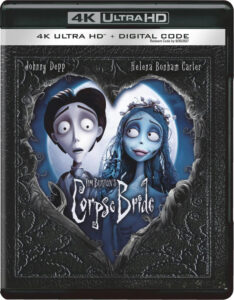 CORPSE BRIDE 4K UHD (77 mins., 2005, PG; Warner): After his 1993 stop-motion feature “The Nightmare Before Christmas” earned critical raves, a cult following, and solid — if not spectacular — box-office, Burton spent years looking for another story that would suit the visual trappings of “Nightmare.”
CORPSE BRIDE 4K UHD (77 mins., 2005, PG; Warner): After his 1993 stop-motion feature “The Nightmare Before Christmas” earned critical raves, a cult following, and solid — if not spectacular — box-office, Burton spent years looking for another story that would suit the visual trappings of “Nightmare.”
The resulting project was 2005’s “Corpse Bride,” an unfortunately slight and forgettable exercise from the auteur that still has managed to net a following among the director’s devotees.
The not terribly compelling or appealing story revolves around a young man named Victor (voiced by Johnny Depp), who’s about to enter into an arranged marriage with a stuffy, obnoxious family named the Everglots. Their daughter Victoria (articulated by Emily Watson), however, is a sweet and quiet soul not unlike Victor’s somewhat timid hero, so all does not appear lost…at least not initially. While performing the wedding rehearsal, Victor walks outside into the cold, lonely forest, where he meets the spectral spirit of a young woman (vocal work by Helena Bonham Carter) who promptly agrees to be wed, and takes our protagonist into the decidedly more colorful underworld, where ghosts and ghouls gather for a swingin’ good time.
Visually “Corpse Bride” provides as much of a feast as “The Nightmare Before Christmas,” with the story’s two contrasting worlds being marked by the presence of color — in Burton’s point of view, “reality” is grey, drab and de-saturated, while the supernatural realm is dominated by splashes of warm, primary hues. The character movements and camera work seem to be more complicated than those on-hand in “Nightmare,” and fans of the filmmaker will, at least, find plenty of Burton’s visual flair on-hand to sustain multiple viewing.
Regrettably, “Corpse Bride” otherwise ranks as a somewhat substantial disappointment. The John August-Caroline Thompson-Pamela Pettler screenplay does not present interesting characters or a developed enough story to sustain the movie’s 77 minutes. As much time is spent on detailing the machinations of Victor’s obnoxious in-laws as it is on our hero’s relationships with his future wife and the “Corpse Bride” — perhaps the result of there being not enough material to carry the slim premise to “feature” length. Whatever the case may be, there’s just something cold and un-involving about the picture.
Also proving to be a letdown is the soundtrack: Danny Elfman’s unremarkable score is below-par for the composer’s standards, marked by forgettable songs that fail to move the plot forward the way his sprightly, memorable tunes from “The Nightmare Before Christmas” did. His melancholy theme for Victor (which the character performs on the piano early on) is poignant enough, but there simply aren’t enough of those moments in the soundtrack, while a pseudo-Gilbert & Sullivan tune starts the movie off on the wrong foot.
That, essentially, sums up “Corpse Bride.” The picture does boast a lovely ending — along with sporadic touches of black comedy — but its appeal may be limited to die-hard Burton aficionados, and even then, likely without the affection fans had for his earlier forays into stop-motion animation.
Warner’s 4K UHD (1.85) does look marvelous with this “20th Anniversary Edition” including a new HDR10 transfer. The image is lovely and the disc reprises both its previous 5.1 DTS MA soundtrack and all the extras from its earlier releases.
 PEKING OPERA BLUES 4K UHD (105 mins., 1986; Shout): One of the most acclaimed Hong Kong imports from the mid ‘80s, “Peking Opera Blues” sees director Tsui Hark mixing up his typical blend of action with comedy and satirical components in its portrait of three women (Brigitte Lin, Cherie Chng and Sally Yeh) who head off in search of liberation following China’s first democratic revolution. Hark’s stylish and energetic film offers appealing performances and is a lot of fun, in addition to holding a good amount of cultural relevance – components that immediately branded it an art-house hit across the globe.
PEKING OPERA BLUES 4K UHD (105 mins., 1986; Shout): One of the most acclaimed Hong Kong imports from the mid ‘80s, “Peking Opera Blues” sees director Tsui Hark mixing up his typical blend of action with comedy and satirical components in its portrait of three women (Brigitte Lin, Cherie Chng and Sally Yeh) who head off in search of liberation following China’s first democratic revolution. Hark’s stylish and energetic film offers appealing performances and is a lot of fun, in addition to holding a good amount of cultural relevance – components that immediately branded it an art-house hit across the globe.
Shout’s new 4K scan of the OCN (1.85, mono) is out this week on UHD featuring Dolby Vision HDR that enhances all the color of Hark’s picture, shot by Poon Hung Seng. Both Cantonese audio and an English dub are offered with extras including a commentary by critic James Mudge; interviews with actor Mark Cheng, cinematographer Ray Wong, author Grady Hendrix, critic David West, and professor Lars Laamann. Trailers, an image gallery, a Blu-Ray copy and archival conversations with Sally Yeh and composer James Wong round out a must-have for HK aficionados.
MEGAN 2.0 4K UHD/Blu-Ray (120/121 mins., PG-13/Unrated; Universal): The first “M3GAN” was a surprise-office performer but a one-trick pony, serving up enough of a premise (cute little child’s AI-enhanced female plaything turns psycho) to sustain most viewers’ appetite for a single viewing. When called upon to support a sequel few really wanted to see, audiences stayed home, turning “M3GAN 2.0” into one of 2025’s biggest studio misfires.
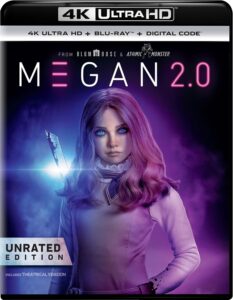 It’s not hard to see why, either, as writer-director Gerard Johnstone weirdly tries a more action-oriented approach with developer Allison Williams and her daughter back for more and M3GAN herself now a souped-up heroine trying to stop an even worse robot gone crazy. There are a few laughs but the concept has been stretched thin at this point and the padded running time exceeds one’s patience on top of the fact that this was one sequel that didn’t need to be made.
It’s not hard to see why, either, as writer-director Gerard Johnstone weirdly tries a more action-oriented approach with developer Allison Williams and her daughter back for more and M3GAN herself now a souped-up heroine trying to stop an even worse robot gone crazy. There are a few laughs but the concept has been stretched thin at this point and the padded running time exceeds one’s patience on top of the fact that this was one sequel that didn’t need to be made.
Universal’s 4K UHD (2.39) sports Dolby Vision HDR and Dolby Atmos sound; a slew of Making Of featurettes, the Blu-Ray, a Digital HD code, and both the PG-13 and unrated versions of the sequel.
AZTEC BATMAN: CLASH OF EMPIRES 4K UHD (90 mins., 2025, R; Warner): Utterly oddball affair serves up something that may have well been concocted in the height of our recent DEI insanity, with a crusading “Yohualli Coatl” serving as the Aztec version of Batman – looking to save his people from evil colonists in the form of vile Conquistador Hernan Cortes. Beyond the weird reconfiguration of the DC Comics heroes to this historical time frame, “Aztec Batman” offers a heavier dose of R-rated violence making it unsuitable for younger viewers while being far too simplistic (in terms of story and animation) for adults. Warner’s 4K UHD includes HDR10 enhancement, 5.1 DTS MA sound, two featurettes and a Digital HD code.
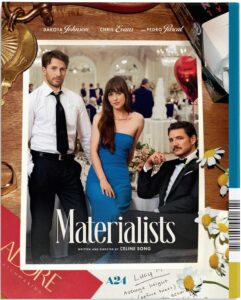
Version 1.0.0
THE MATERIALISTS Blu-Ray (116 mins., 2025, R; A24): Director Celine Song follows up her hit “Past Lives” with this ensemble comic-drama about an NYC matchmaker (Dakota Johnson) who ends up inside her own relationship triangle, stuck between the dashing man she just met (Pedro Pascal) and her decidedly less dashing ex-boyfriend (Chris Evans). The appealing performances make this uneven but always entertaining film worthwhile, with Song mostly adhering to a traditional formula but spicing the picture up with both heavier dramatic and lighter elements. It doesn’t entirely gel but “The Materialists” is not an unappealing view. A24’s Blu-Ray (1.85) is now available sporting Song’s commentary, a featurette, six collectible postcards, and “Composer Deep Dive With Japanese Breakfast.”
UNICORNS Blu-Ray (119 mins., 2023; Cohen): Cross-cultural sparks fly when a single father auto mechanic and a British-Indian drag queen come together in “Unicorns,” a relationship drama about breaking boundaries from Sally El Hosaini and James Krishna Floyd. Cohen’s Blu-Ray (2.39) is now available featuring 5.1/2.0 audio.
THE BUSTER KEATON SHOW Blu-Ray (aprx. 5 hours, 1950; Liberation Hall): Golden Age TV fans should be excited to learn of the restoration of selected episodes from “The Buster Keaton Show,” a short-lived program that aired only on the West Coast. For Keaton aficionados, this double-disc set from Liberation Hall features a pair of rarely-seen episodes from the series’ kinescope-broadcast first season, presented in good condition, plus seven more episodes from its second season, which were shot on film. Fans should enjoy this little-seen series presented thanks to archivist Jeff Joseph, with extras including the CBC special “Three Comedians in Closeup,” a Keaton episode from “This Is Your Life, the 1957 short “Circus Time,” plus two ‘20s shorts: “Cops” and “The Goat.”
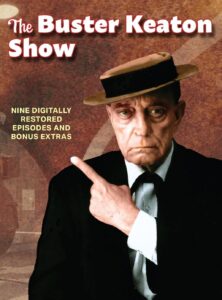 THE LAST HORROR FILM Blu-Ray (87 mins., 1982; Troma): Independently made cult item stars “Godfather” and “Maniac” vet Joe Spinell as a cab driver who follows actress Caroline Munro to the Cannes Film Festival where slowly but surely her entourage starts to vanish. Shot on-location by director David Winters, this eclectic picture from Troma receives a new Blu-Ray from MVD featuring a boatload of extras: an intro by Troma’s Lloyd Kaufman; commentaries; interviews; Spinell in Buddy Giovinazzo’s “Mr. Robbie”; a full episode from the “Kabukiman’s Cocktail Corner” featuring Paul Booh; highlighs from the “Tromadance Film Festival”; 1080p (1.85) transfers and mono sound.
THE LAST HORROR FILM Blu-Ray (87 mins., 1982; Troma): Independently made cult item stars “Godfather” and “Maniac” vet Joe Spinell as a cab driver who follows actress Caroline Munro to the Cannes Film Festival where slowly but surely her entourage starts to vanish. Shot on-location by director David Winters, this eclectic picture from Troma receives a new Blu-Ray from MVD featuring a boatload of extras: an intro by Troma’s Lloyd Kaufman; commentaries; interviews; Spinell in Buddy Giovinazzo’s “Mr. Robbie”; a full episode from the “Kabukiman’s Cocktail Corner” featuring Paul Booh; highlighs from the “Tromadance Film Festival”; 1080p (1.85) transfers and mono sound.
NEXT TIME: OCN Fall Rundown! Until then, don’t forget to drop in on the official Aisle Seat Message Boards and direct any emails to our email address. Cheers everyone!
